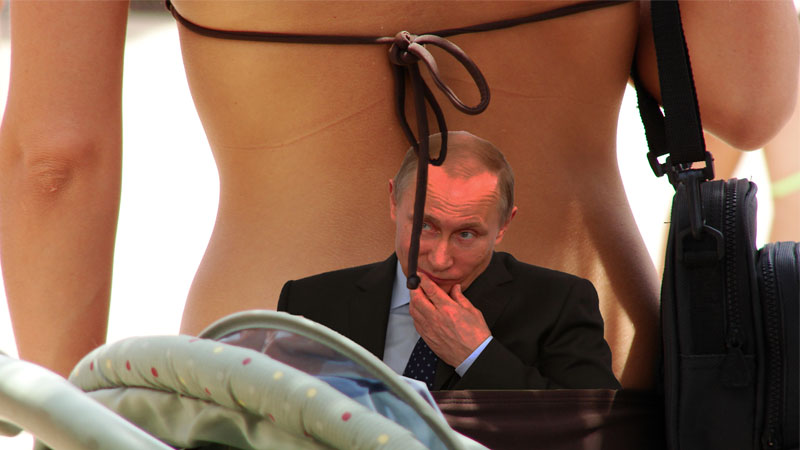
Image edited by Kevin Rothrock.
Russia’s parliament will soon debate [1] its next intervention into the lives of citizens: forcing tattoo parlors to warn women that ink in their lower backs could make it dangerous to receive epidural anesthesia during child birth. The legislation [2], which the Duma is scheduled to discuss today, October 10, is billed as a consumer protection regulation, but many—if not most—Russians seem to interpret it as the latest in a series of laws aimed at curbing supposedly immoral behavior. Reactions have been even more animated because several Russian news outlets misleadingly describe [3] the initiative as an effort to ban outright lower-back tattoos for women.
In comment threads online, in forums and social media apparently dominated by men, the discussion about lower-back tattoos on women has more to do with aesthetics than health concerns. “A cute booty without all kinds of painted crap is a lot prettier,” Aleks3 writes on the Vott.ru message board [4], posting links to images of women’s midriffs, one tattooed, and one au naturel. “Feel the difference,” he beckons readers.
Another charming lad, who uses the Vott.ru name “Fosnet” and evidently supports the effort to rein in back tattoos on women, declares, “a tattoo on the ass is already evidence of some disability in the head. Childbirth is hardly something to add.”
Russian-language RT shared its coverage of the tattoo story on Vkontakte, Russia’s most popular online social network, where users left almost 200 comments [5]. Again, most of the responses belong to men whose overriding concern is the degree to which a lower-back tattoo signals a woman’s sexual promiscuity. “I think that such tattoos are found on whores and sluts, who, considering their lifestyle, should be banned in principle from having children, as they’ll only give birth to the same kind of people,” writes Alexey Maslov, before adding, “Maybe I’m mistaken.”
Tatiana Seminchenko, a young woman living in Krasnodar, dared to engage Maslov on the question of “Why do you think this way?” He answered that tattoos on women belong to a “whole, global plan” by Europe, “with its incest and samesex marriage.”
Male chauvinism and homophobia are nothing new—not in Russia or anywhere else—but it’s hard to ignore how the Duma’s new effort to protect women from tattoos dovetails with the country’s current reactionary trends. As the conflict in eastern Ukraine simmers on an uneasy ceasefire, Russian lawmakers might consider returning to the prewar politics of moral outrage. Before Moscow battled the “fascists” seated in Kyiv, it spent years guarding Russians from wicked foreign foster parents and dubious sexual deviants. Legislation against “back tattoos on women,” ostensibly based on medical considerations, has the potential to please a large segment of people who already fear the West’s “whole plan.”